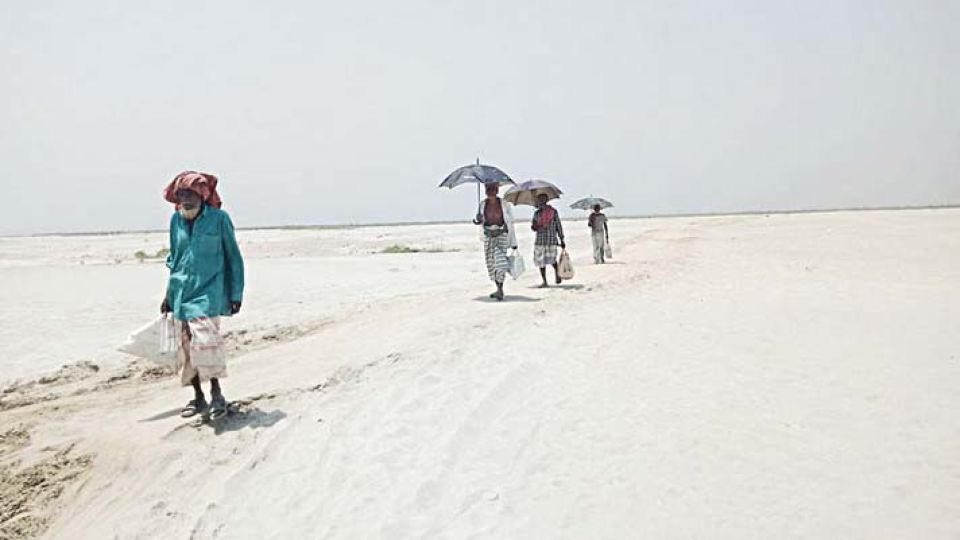May 21, 2024
DHAKA – Abdul Hakim, a day labourer from Shilaidah village in Kushtia, faces increasing difficulty crossing the Padma to get to Pabna town. The once familiar passage across the Padma, a lifeline between his home and profession, has morphed into a daunting odyssey.
“I have to now walk three kilometres across the shoal and ride two boats over a one-kilometre stretch of water,” he said.
The Padma river begins to dry up from the end of November and doesn’t recover until late July, depending on the monsoon.
The shoal between Shilaidah and Pabna extends over three kilometres of the four-kilometre crossing, leaving only two small areas with navigable water during this season.
What used to be a straightforward trip now takes up to two hours, with the hot sand making the journey even more challenging.
At Shilaidah ghat in Kushtia, dozens of workers were seen trudging across the shoal, resembling a desert landscape.
“Crossing the Padma feels like travelling across a desert, with vast shoals covering three out of the four kilometres and only small sections of water remaining,” said Jubayer Hossain, another commuter.
The intense heat of the sand makes the journey nearly impossible, Jubayer added.
Manik Hossain, a boatman at Shilaidah ghat, said, “Previously, several hundred individuals would journey between Pabna and Kushtia via the Padma daily. However, now due to the existence of vast shoals, half of the passengers have opted out of this mode of transportation.”
Manik attributes the problem to reduced water flow from upstream.
“The river dries up during the summer months due to reduced water flow from upstream, leading to difficulties for commuters,” he explained.
Anwar Hossain, an ice cream vendor from Koshba village in Kumarkhali, has stopped travelling to Pabna markets.
“I used to sell ‘Kulfi’ at the Pabna markets but ceased my trips there recently due to the challenging conditions of crossing the Padma in the past few weeks,” he said.
Shahidur Rahman, the secretary of Bangladesh Nodi Bachao Andolon in Pabna, reiterated the severe impact of Farakkah on the Padma River, which leads to prolonged dry spells in many areas of the river, causing immense hardship, especially for low-income people.
Md Mosharaf Hossain, assistant director of Pabna’s water development board, said, “Navigating the Padma becomes challenging every summer, and the current situation has worsened due to insufficient water flow from upstream and scanty rainfall.”
Additionally, the lack of rainfall this summer exacerbates the situation. The river will revive once the monsoon water arrives, Mosharaf added.


